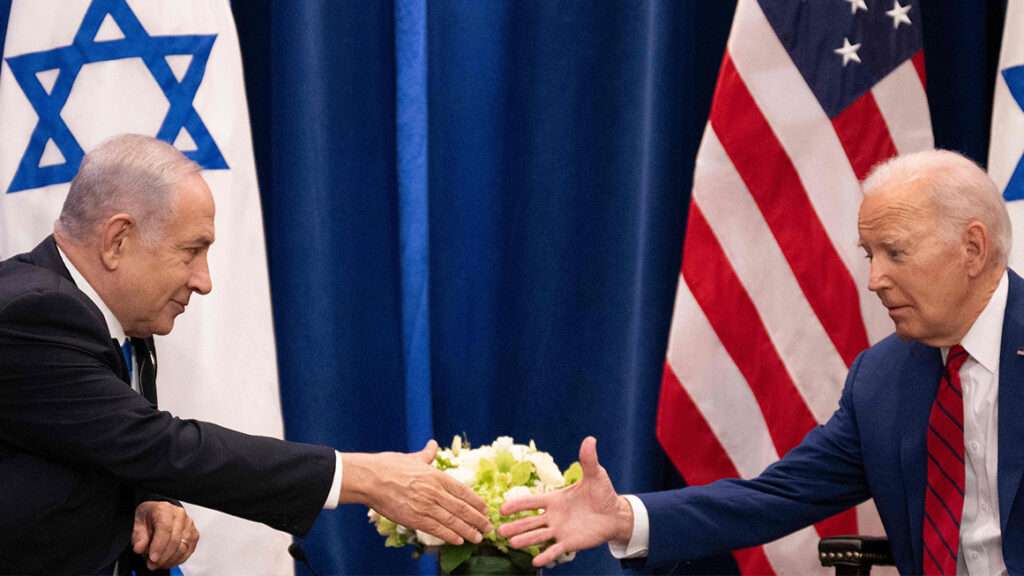In March 14, 2024, Senate Majority Leader Chuck Schumer (D–N.Y.) announced to Israeli Prime Minister Benjamin Netanyahu that it was time for him to step down, citing the need for a new election in Israel. Schumer emphasized the importance of breaking the cycle of violence, maintaining Israel’s credibility, and working towards a two-state solution.
If Netanyahu were to win in a new election and continue policies that Schumer disapproves of, Schumer warned that the United States would intervene to shape Israeli policy using its leverage, including the $3.8 billion in annual aid given to Israel.
This stance is shared by many American critics of Israeli policy, who argue that aid should be used to influence Israeli behavior. President Joe Biden also hinted at conditioning aid to Israel based on its actions, particularly in response to civilian harm and humanitarian suffering.
However, following a series of events including an attack by Iran on Israel, Biden ultimately supported a $26.38 billion Israeli aid package, emphasizing Israel’s long-term defensive needs.
The conversation about leveraging aid to influence Israeli policy is crucial in addressing the ongoing conflicts in the Middle East. While there are differing views on the approach, the need for a strategic use of aid is evident in navigating complex geopolitical challenges.

President Joe Biden; Jim Watson/AFP via Getty)
End it, Don’t Mend it
Three months before the October 7 massacre, the American Jewish publication Tablet published a provocative essay by Jacob Siegel and Liel Leibovitz bluntly headlined “End U.S. Aid to Israel.”
The brief: “Israel ends up sacrificing far more value in return for the nearly $4 billion it annually receives from Washington. That’s because nearly all military aid to Israel…consists of credits that go directly from the Pentagon to U.S. weapons manufacturers,” they wrote. “In return, American payouts undermine Israel’s domestic defense industry, weaken its economy, and compromise the country’s autonomy—giving Washington veto power over everything from Israeli weapons sales to diplomatic and military strategy.”
Critics of Israel, particularly in light of the subsequent war with Hamas, will surely blanch at the notion that Washington has anything like “veto power” over Tel Aviv. Yet America has nonetheless coordinated and consulted on policy far more closely with Israel, including during this conflict, than it has on, say, nearby NATO ally Turkey in its ongoing battles with Syrian Kurds. All at a time when the comparative purchasing power of America’s Israeli aid has plummeted.
“The Israel of 2023,” Siegel and Leibovitz observed, “is immeasurably wealthier and more powerful than the dusty socialist country of 40 years ago, where local electrical grids could be overloaded by American hair dryers.” Boy howdy is it.
Israel now has a higher gross domestic product (GDP) per capita than Japan and Italy, and is closing in fast on France and the United Kingdom. In 1981, as the hawkish former Assistant Secretary of State Elliott Abrams pointed out in Commentary last year, “the United States provided Israel with $4.5 billion in economic and military aid at a time when the entire GDP of the Jewish state was only $25.4 billion.” Now? GDP is north of $500 billion.
Annual U.S. aid has gone from 17.7 percent of the Israeli economy to 0.7 percent; even with the big new cash infusion, that figure goes up this fiscal year to just 5.7 percent. And as Biden himself crassly observed when selling the supplemental, the strings attached include “send[ing] military equipment from our own stockpiles, then us[ing] the money authorized by Congress to replenish those stockpiles—by buying from American suppliers….[We’re] help[ing] our friends while helping ourselves.” So America is sending money that Israel no longer needs to lock in long-term contracts for the military-industrial complex. (The 10-year, $38-billion Memorandum of Understanding signed by President Barack Obama in 2018 allowed for Israel to spend about a quarter of the annual total on its own domestic defense production until this year, after which the percentage is to be ratcheted steadily down to zero.)
This close military partnership, which has been the basic bilateral setup since not long after the 1967 Six Day War, has produced benefits for both Washington and Jerusalem. Israel gets some of the world’s most advanced defense tech, such as the Iron Dome and David’s Sling missile-interception systems; the U.S. gets premium intelligence in a volatile region and a privileged seat at the table for making commerce-lubricating peace deals.
But it’s also true those contracts could be freely entered into, without a cent of U.S. taxpayer money, just as both Sanders and anti-interventionist Republicans like Sen. Mike Lee (R–Utah) would prefer. What would happen to American influence then?
“Weaning Israel off of American assistance would have the added advantage of removing the issue of conditioning such aid or using it as leverage, ideas that sometimes surface when the United States and Israel differ on important policy issues, such as the peace process,” former Israeli Justice Minister Yossi Beilin and former U.S. ambassador to Israel and Egypt Daniel Kurtzer wrote four years ago in The National Interest.
In other words, say goodbye to Schumer’s—and Biden’s—serially insisted-upon “two-state solution,” which has been a political non-starter in Israel especially since October 7. And don’t be surprised if the country’s regional Qualitative Military Edge, enshrined in U.S. law, would be deployed more freely in preemptively striking Iran’s offensive capabilities, whether in missile production, nuclear development, or senior-level military planning.
So would cutting aid to Israel actually lead to more, not less war? Making predictions in the Middle East is a fool’s errand. But one way to think through the scenario planning, and move faster toward a world where foreign policy commitments are more commensurate with the domestic public opinion of the countries involved, is to remember a factor that too often escapes attention: Israel is hardly the only country along the Arabian Peninsula to receive billions in American military aid.
What Leverage Bought
If the U.S. permanently cut off all aid tomorrow—and even if the American Israel Public Affairs Committee, the infamous “Israel lobby,” were suddenly to close up shop—the bonds of affection between the two countries would still remain strong. According to a Gallup poll, Israel has for the past quarter-century been among the leading countries toward which Americans have the most favorable opinion. Eighty-five percent of the world’s Jewish population lives either in the U.S. or in Israel, in roughly equal numbers (the numerical capital of Jewry is not Tel Aviv or Jerusalem, but New York City). There are some 200,000 dual citizens living in Israel; at least 33 were killed by Hamas on or after October 7, and five more were still believed to be held hostage as of May 1. Even as Americans—particularly Democrats, and the young—have soured on Israel’s prosecution of the war, there remains between the countries a shared liberal democratic (and capitalistic) culture and decades’ worth of human intercourse.
Now consider Saudi Arabia.
The country that has purchased more U.S. military equipment than any other—at $140 billion and counting—has been unpopular with the American public for the entire 21st century, and not only because it was home to most of the September 11 hijackers. The House of Saud’s dictatorial monarchy routinely ranks near the bottom of global freedom indices, women only recently were granted the right to drive a car, and the regime infamously assassinated Washington Post columnist Jamal Khashoggi in 2018. Saudi Arabia has played a significant role in the brutal Yemeni civil war, which has resulted in nearly 400,000 deaths, according to the United Nations. Despite this, Saudi Arabia has remained a key strategic partner with the United States for almost eight decades. The kingdom’s diplomacy and wealth from oil production have allowed it to align itself with American interests throughout various historical events such as the Cold War, Gulf War, Iraq War, and efforts to contain Iran.
Currently, Saudi Arabia is being courted by the United States for a potential peace agreement with Israel, similar to the historic 2020 Abraham Accords. The Saudis have requested a military security guarantee as part of the deal, a privilege only held by a few other countries. This showcases the leverage that the U.S. has in the Middle East, as it has developed alliances with various countries in exchange for support in different conflicts or initiatives.
The U.S. has historically provided significant aid to countries like Israel and Egypt to secure peace treaties and alliances, despite public opposition in those countries. This has led to tensions between authoritarian leaders and their populations, who may resent the close ties with the U.S. and Israel. However, the geopolitical realities often force leaders to make unpopular decisions for the sake of security and stability.
For countries like Jordan, which rely heavily on U.S. aid and cooperation with Israel, maintaining a delicate balance between public sentiment and strategic partnerships is crucial. This can be a challenging task, especially when faced with internal unrest, regional conflicts, and economic instability.
While the current American foreign policy status quo may have achieved certain diplomatic successes, it is important to reassess these relationships in light of changing public opinion and evolving global dynamics. The U.S. must be mindful of the potential consequences of continuing on imperial autopilot, as elite corruption and populist backlash can arise when institutions outlive their original purposes. In the famous words of former United States Ambassador to the United Nations Madeleine Albright in 1993, “What’s the point of having this superb military that you’re always talking about if we can’t use it?” Albright’s interventionist stance ultimately shaped Clinton’s foreign policy, leading to Colin Powell becoming a key proponent of President George W. Bush’s controversial Iraq war.
The war in Afghanistan, America’s longest and least popular conflict, persisted for over two decades before President Biden finally brought it to an end. Despite skepticism towards NATO and Washington’s dominance in Europe, the alliance remains a key military paradigm. However, there is growing domestic opposition to longstanding institutional commitments.
In the Middle East, Washington’s role, though more recent, is similarly outdated. With no need to counter the Soviet Union or depend on foreign oil, the belief in spreading liberal democracy through force is no longer sustainable. If the U.S. were to reassess its approach to the region, a shift away from military intervention and towards aligning with public opinion would be necessary.
This reevaluation would likely result in a significant reduction in foreign aid, with some countries losing support while others, like Ukraine, Israel, and Taiwan, maintain it. The public’s weariness of extensive foreign aid without clear strategic goals underscores the need for a more modest and coherent foreign policy approach.
The events of October 7 highlighted the untenable nature of the status quo in the Middle East. Israel’s security concerns, Gaza’s governance issues, and regional power dynamics all contribute to a volatile and unsustainable situation. Reassessing aid to countries like Qatar, Egypt, and Saudi Arabia could encourage greater responsibility and accountability among regional actors.
By reducing military involvement and aid to certain Middle Eastern countries, the U.S. could focus on defending its own interests and upholding its moral standing in the world. Managing America’s imperial drawdown in a deliberate manner would help navigate between fading Atlanticism and resurgent populism.
In conclusion, the superb military should be utilized to defend America’s interests rather than engaging in costly and unsustainable interventions abroad. This shift in approach would mark a conscious effort to reevaluate America’s role in the world and prioritize its own security. Please rewrite this sentence.
Source link






